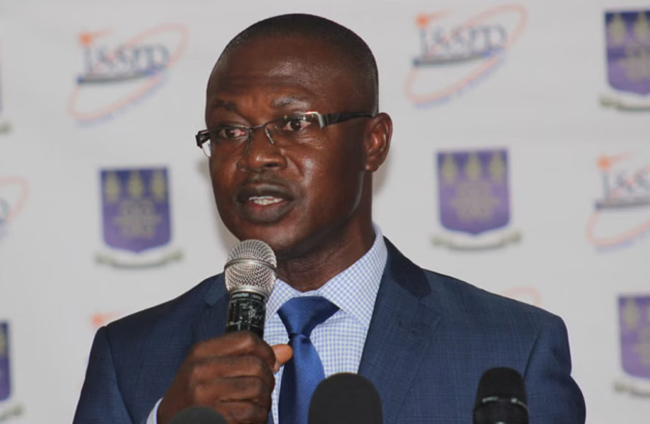A Senior Research Fellow at the Institute of Statistical, Social and Economic Research (ISSER), Professor Charles Ackah, has stated that Ghana’s recent shift to heavy private market borrowing is a dangerous debt strategy.
In JoyNews’ hotline documentary titled "A Nation That Begs," produced by Isaac Kofi Agyei, the dire debt situation of Ghana was brought to light. The film shed light on Ghana's repeated reliance on the International Monetary Fund (IMF) for debt relief, totaling 17 times.
Discussing the documentary on JoyNews' AM Show, Prof Ackah highlighted the concerning state of Ghana's macroeconomic and debt management practices.
According to him, the country is heavily reliant on foreign aid due to its inability to generate sufficient domestic revenue. He emphasised, “When a country refuses to raise adequate domestic revenue, especially through taxation, the only way to break the resource constraint is to depend on external capital."
While Ghana previously borrowed from multilateral and bilateral sources, such as the Paris Club, recent years have witnessed a shift towards the private capital market.
Professor Ackah expressed deep concern about this shift, stating "That is, for me, the most dangerous part of our borrowing or debt management strategy.
“And we are borrowing at high-interest rates even though they are lower than the domestic rates. But because of the exchange rate problem, when you borrow dollars at a rate of about 10%, then you need to make sure that your return on investment, or all that you use the funds for, the return should exceed 10%,” he added.
"Most of the time, when we borrow foreign currency, we use it to support the budget or refinance existing debt. We are not really investing it in a way that yields returns of even 2%," Prof Ackah cautioned.
He further highlighted that since the 1980s, most of Ghana's borrowings have resulted in returns ranging between 0.8% and 1.4%, while interest rates remain around 9-10%. This mismatch between returns and interest payments has led to a growing debt problem for the nation.
According to Prof Ackah, the returns from foreign loans are not invested sustainably and productively, which would generate greater profits to service the interest. This inefficient and non-prudent approach to debt management exacerbates Ghana's debt crisis.
One way, he suggests, to achieve a sustainable debt profile is by growing the economy, as debt sustainability is determined by dividing the total debt stock by GDP.
"If the country can sustainably grow at 8%, 9%, or 7% for a decade, you will see that the debt-to-GDP ratios will fall,"
Ghana’s revenue sources
The Professor further highlighted that the primary external capital source for Ghana has been export revenue, which has been hindered by the country's heavy reliance on a limited number of commodities, resulting in inadequate foreign exchange earnings.
Foreign Direct Investment (FDI), another source of external capital, has seen a significant slump as Ghana has struggled to attract sustainable foreign investments. Prof Ackah described the inflow of capital as primarily "greedy", referring to foreign investment, and "hot money," mainly concentrated in the resource sector, such as oil and gold mining.
Insufficient capital control measures have failed to ensure sustainable development, as investors often repatriate their capital or profits during times of crises, leading to capital flight and limited benefits for the country.
“Investors come in and we don’t get maximum benefit from it and when there are crises there is capital flight. They repatriate most of their capital or their profit,” Prof Ackah explained.
Prof Ackah indicated that remittances, another source of external capital, are insufficient to meet the country's needs. He pointed out that remittances are typically procyclical, increasing during times of crisis when families send money to their relatives and so are not reliable and sustainable.
Additionally, Ghana's tourism sector has not been fully developed to attract significant sums of remittances. Consequently, borrowing has become the default channel for financing the economy, both externally and domestically, especially as aid has reduced with Ghana's transition to a middle-income country.
Latest Stories
-
Tesla deliveries fall for second quarter in a row
2 hours -
Catherine talks candidly of ‘life-changing’ cancer treatment
2 hours -
Ugandan military helicopter catches fire in deadly Somalia crash
3 hours -
Dramatic moment Sean ‘Diddy’ Combs fell to his knees after learning his fate
3 hours -
2026 NPP Primaries: National Council decision biased, unreasonable – Addai-Nimoh
3 hours -
Qualifier Tarvet impresses but cannot shock Alcaraz
4 hours -
Ghana and India to expand cooperation in trade, agriculture, energy – Mahama
4 hours -
Your visit reaffirms our collective commitment to global peace, prosperity – Mahama tells Narendra Modi
4 hours -
Israel: A divine and historical claim rooted in scripture and truth
4 hours -
Norway fight back to beat Euro 2025 host Switzerland
4 hours -
Anabel Rose unveiled as Fresh Finds Spotify cover for June
4 hours -
Stalled Winneba-Kasoa highway sparks concerns over unpaid contractor arrears
4 hours -
‘Diddy’ denied bail after being cleared of most serious charges
4 hours -
Court discharges lecturer, 2 students over room, bed allocation scandal
4 hours -
Friday Club urges NPP presidential hopefuls to prioritise unity and issue-based campaigning
5 hours

